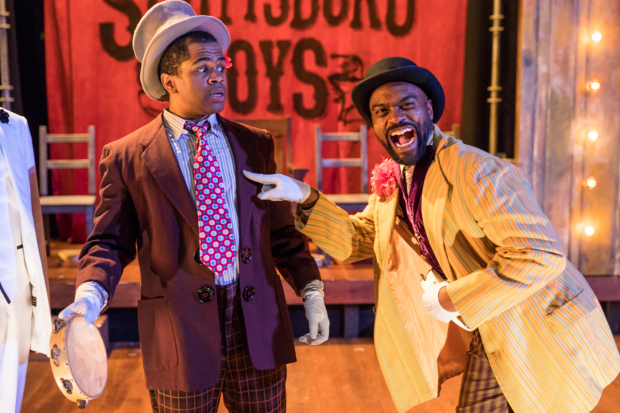The Scottsboro Boys
A stunning yet searing production takes the stage for its local premiere.

(© Nile Hawver/Nile Scott Shots)
Who would have thought that the true, infamous, and heartbreaking case of the Scottsboro Boys would carry so much weight in contemporary times, given the trajectory of race relations since 1931 when nine black boys and men were pulled off a train in Alabama and falsely accused of raping two white women? The SpeakEasy Stage revival of the 2010 musical The Scottsboro Boys — by John Kander, the late Fred Ebb, and David Thompson — seems eerily prescient in our current atmosphere of fraught racial relations.
The format of the musical, framed by the traditions of that uniquely American stage tradition, the minstrel show, is frisson-inducing right from the top. Although minstrelsy is now frowned upon, the opening number of The Scottsboro Boys ("Hey, Hey, Hey, Hey!") — sung by the black cast and the show's one white character, the Interlocutor (Russsell Garrett) — can't help but bring an instant prick to the spine.
It's hard to find anything funny about the plight of innocent men incarcerated for a crime they never committed, and to watch the actors sing, dance, and crack jokes, including a tap dance to a number called "Electric Chair," presented in the broadest of hateful clichés. One of the novelties is the multiple casting of several of the black actors in the roles of white people, including the sheriff (Maurice Emmanuel Parent) who arrested them and the two female accusers (Darrell Morris Jr. and Isaiah Reynolds), described as "po' white trash" in the show.
After the men (and boys, one as young as 12), riding the rails in a boxcar to find work outside the South, were jailed in Scottsboro, they were subjected to trial and after trial that ended in guilty verdicts, even after one of the women recanted her testimony. It was not until the case was brought (twice) to the Supreme Court and taken up by activists in the North, that the threat of death by the electric chair (or lynching) was struck down. Four of the men were freed in 1937, and three more were paroled from 1940-44. Haywood Patterson, who never stopped declaring his innocence, died in jail in 1952. Finally, in 2013, the governor of Alabama granted a posthumous pardon to the Scottsboro Boys.
The nine men in the SpeakEasy Stage revival are anchored by a richly sung, complex performance by De'Lon Grant as Patterson, a man who learned to read and write while in jail. He uses his powerful physique, telling facial expressions, and high-beamed focus of his eyes to create a character that is both commanding and poignant. Wakeem Jones as the frightened 12-year-old Eugene Williams, who is homesick for his mother, and Reynolds as the hot-headed Ozie and Ruby Bates are two more standouts among the highly gifted ensemble. Parent is a revelation as the singing and dancing Mr.Bones, and Brandon Green transforms from the goofy second banana Mr. Tambo to the impassioned Jewish lawyer from New York, who is startled by the anti-Semitism of the Alabama court.
The musical unfolds on a nearly bare stage at the Calderwood Pavilion, Boston Center for the Arts, leaving plenty of room for Ilyse Robbins' rousing choreography and the many scene changes. The flexible, easily moved scaffolding and a set of metal chairs, backed by a raised stage and surrounded by a faded proscenium arch, was designed by Eric Levenson, with lighting by Daisy Long.
The Scottsboro Boys is an effective and affecting piece of theater that is not only to the credit of creators, Kander, Ebb, and Thompson, but to Paul Daigneault's sharp-edged direction, Robbins' multistyled choreography, Matthew Stern's music direction, and the splendid cast as well. All of their forces combined result in a truthful and brave production of a show that feels like anything but a timepiece.









